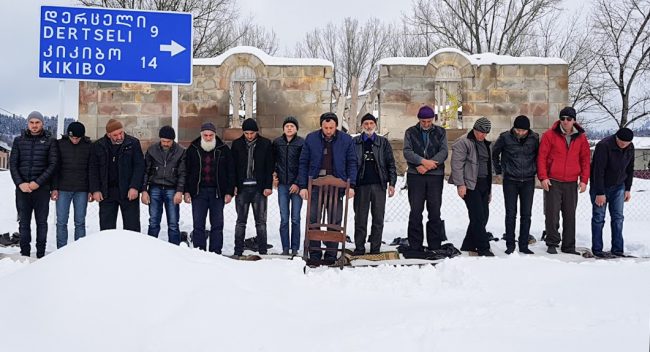


 After a dispute broke out between Christians and Muslims over the ruins of an old building in Mokhe, a village in Adigeni Municipality, the government created a commission to determine the building’s historical belonging. After two years of work, the commission decided not to grant ownership of the ruins to either side. Instead, it declared them a cultural heritage site, named ‘Disputed Building’.
After a dispute broke out between Christians and Muslims over the ruins of an old building in Mokhe, a village in Adigeni Municipality, the government created a commission to determine the building’s historical belonging. After two years of work, the commission decided not to grant ownership of the ruins to either side. Instead, it declared them a cultural heritage site, named ‘Disputed Building’.
Many of the local Muslims had shown distrust towards the commission from the very beginning, as the State Agency for Religious Issues, which coordinated the process, did not include any of them among the commission’s members.
They pointed to the government’s strong influence over Georgia’s Muslim Administration. The government built a new mosque, where some now go to say their prayers. But it did not resolve the problem, as others still come back to the disputed building, where they continue to pray in protest. They still demand the government study the building’s origins in order to protect their historical and cultural footprints. And their fight has become a matter of protecting dignity.
While the government thinks they have resolved the problem, a number of the local Muslims still feel that the state policy is discriminatory. This can be well seen through developments in Mokhe and nearby villages over the past few years.
2013 was the year when limitations of Muslims’ rights in Adigeni Municipality began to take a greater scale. Many in the Muslim community think that a policy of discrimination and marginalisation against them is the result of the influence local Christian authorities have over government officials. They say it’s aimed at erasing the Islamic history of the region.
- In 2013, a newly built minaret on the Chela Mosque was taken down on the orders of the Revenue Service, with the help of law enforcement. Police beat and arrested 21 muslims. Many locals say it was Christian Church authorities who had gathered signatures asking to take down the minaret.
- One of the organisers of the demonstrations against the minaret was Giorgi Kopadze, who had previously worked for the local church. In 2016, he was nominated as the majoritarian candidate for the area by the Georgian Dream party. Kopadze is now an MP.
- Later in 2013, the Chela minaret was returned but damaged.
- On 22 October 2014, police arrested 14 Muslims for hindering the demolition of the disputed building in Mokhe.
- In 2014, local authorities refused to re-appoint a Muslim resident of Mokhe to the municipal government. He claimed he is far more qualified than the new Christian appointee. Muslims often complain that they are very poorly or not represented at all in local ruling bodies (except for villages where the population is 100% Muslim).
- In 2014, the State Agency of Religious Issues created a special commission in Mokhe to study the origins of the disputed building. The commission did not include three people who had been put forward by the local population.
- In 2016, the long-serving director of Mokhe’s school, Temur Beridze, was fired ‘because he received two warnings in one year’. Many local Muslims believe this was not the real reason for his firing, and that it was preplanned.
- After Beridze was fired, Natia Rekhviashvili was appointed to replace him. Rekhviashvili was known for her Islamophobic rhetoric during the 2014 dispute between Muslims and Christians. She was actively involved in christians demanding the building not be given to Muslims.
- In 2016, the Mokhe commission decided not to grant ownership of the building to either side. Instead, the government started building a new mosque. For some among the local Muslim parish, this decision was unacceptable — they continue to pray in front of the building to this day.
- The Imam, who decided to pray with his parish at the ruins of the disputed building was fired from the Administration of Muslims. The greatest proportion of the money the government gives to the Muslim community is spent on salaries of religious leaders, which many think is a tool to control them.
- Another dispute between Christians and Muslims occurred in the village of Adigeni in 2016. The dispute broke out when local muslims asked for a separate cemetery, which many Christians were against. Three Muslim residents were injured in the confrontation, which locals say was witnessed by the head of the local government. They said police did not respond to the violence as they should have.
- At the end of 2016, the director of Mokhe school ordered a Muslim girl to take off her hijab. This caused protests from students. An audit from the Ministry of Education did not find her demand to be discriminatory; to the contrary, it stated that the school had legitimate grounds to make such a demand.
- In 2018, muslim teachers accused the school director of discrimination.
This article is a partner post written by Dato Parulava. The original version first appeared on Liberali, on 16 March 2018.







